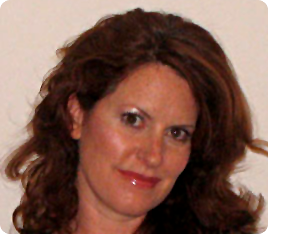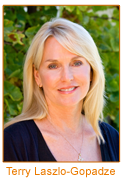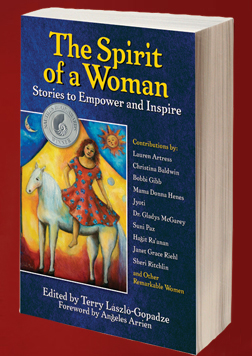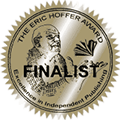Never Alone by Tiffany R. Norman
![]()
 “A woman is like a bag of tea:
“A woman is like a bag of tea:
You never know how strong she is
until she gets in hot water.”
-Eleanor Roosevelt
“Hello!” I called out as I set my bag down. I had just finished work and was emotionally and physically drained. The weeks behind me had been hard, but I knew what was to come would be much worse.
“We’re in here,” called out my older sister, Nadalea, from the bathroom in my mother’s apartment. I made my way down the hallway to the bathroom door and stared in horror. Nadalea was shaving our little sister’s head. Ali was now completely bald.
“It kept falling out in chunks,” Ali said, “so I decided to just shave it.”
I had known she was going to lose her hair, but not yet – not today. A week ago she had had long, curly hair that cascaded halfway down her back. To help her adjust to losing it, she cut it, and for fun, had dyed it red.
Now there was nothing.
I looked at her and tried to hide my fear, pain, and anger. What could I say? My little sister – the girl I would do anything for, the girl I wanted to protect at all costs – had an invisible evil living inside her. I was powerless to defend her against it. Nothing I could do would take away her rare ovarian cancer. How could such a young, beautiful woman, one who loved and adored children so much, who was absolutely magical with them, be denied the chance to have her own? Now she looked as though she belonged in the movie Alien Resurrection.
I wanted to get out of there, to go back three months before this all started. But it was all too real. Instead of running, I stood there and nodded my head. Yes, it made more sense to just shave it off rather than have it fall out over time. I tried to be brave. That’s what big sisters do, right? She needed me; I would not breakdown. This was about her, not me. I also agreed that Nadalea had done a good job of shaving Ali’s head and that, yes, it did look smooth. But as I said it, I hoped that Ali could not read in my eyes that truly, I was horrified – and truly, I was afraid.
Ali began having chemotherapy after the cysts on her ovaries ruptured. One cyst was the size of a grapefruit, the other the size of a lemon. The cysts were discovered on a Friday; surgery was scheduled for the following Tuesday. Unfortunately, the cysts burst first and spread the cancer throughout her body, making chemotherapy necessary. We couldn’t afford the medical bills and other expenses once Ali had quit her job at the daycare center, so we had fundraisers.
Ali’s friends raised money by throwing a party with a band. Nadalea and I arranged a dinner with a raffle and auction at a restaurant. Nadalea canvassed all the local businesses for donations. The business owners were extremely generous. However, I did not want to ask others for help. I wanted our family to be able to afford something, to be able to help Ali when she really needed it, just this once. Unfortunately, it seemed as if we were always depending upon others for help.
The months that followed were difficult. I deferred going away to college to be with her and help care for her. It is amazing how many people are needed to care for someone who has cancer. I had no time to stop and think about how I felt, how it was affecting me. Ali was the sick one; my duty as a sister was to take care of her. My thoughts and feelings were inconsequential, immaterial.
The hardest day for me was when I had to take Ali to the hospital. There I sat with her for eight hours while she had chemicals put into her veins to kill the cancer. That day I was angry. Ali was rambling on about mailing the thank-you cards for the fundraiser and I got mad at her for talking so much. Needless to say, she wasn’t very happy that I was the one sitting with her.
It took me many months to understand, and then explain, the reason I was so angry. I told her how I remembered watching a TV show about Martin Luther King Jr. and the civil rights marches of the 1960s. During one of those marches, firefighters sprayed water from a fire hose to break up the crowd. The tremendous force of the water knocked the protestors against the wall but the firefighters continued to spray them. The protesters could not get away.
One girl stood in front of her younger sister to protect her. She stepped in front of the stream as soon as the water came toward them, instinctively, to protect her sister from harm. I envied that girl because I could not protect my sister from this danger that threatened to take her from me. With Ali, all I could do was sit in the hospital and watch her grow tired as the drugs entered her system. All I could do was watch her face, which had become pale and gaunt, and know she was in pain. I wanted so much to take her place, to have her not feel the pain anymore. But all I could do was silently watch and try not to cry.
During Ali’s illness I developed a love/hate relationship with God. As a shy child, I often had taken comfort in the fact of God’s existence. I often felt that God and my cat were the only beings who understood me. Now I felt as if God and I were in a constant struggle. To be honest, I was very upset with God. I have often heard people say, “God does not give you more than you can handle,” but I believed the burden of Ali’s illness was too much for our small family. We had already “handled” so much – a father who had left the state, without a word of his whereabouts, to avoid paying child support; growing up on state assistance because my mother’s high school education couldn’t land her a job that would support us even if she worked twelve hours a day. There were times when all four of us took refuge in a friend’s living room, taking turns sleeping on the sofa instead of living on the streets. After such a childhood, I wanted to “handle” having wonderful things happen in my life. Didn’t God know that He could also give me these types of situations, I wondered.
What kind of a person thinks and feels like this? How could I ask for God’s help when I was so angry with God? I couldn’t reconcile my feelings. So instead, I just quit talking to God. Now I felt truly alone.
Shortly after Ali’s last chemotherapy session, I moved away from my family to begin school at the University of California at Berkeley. That is a nine-hour drive from San Diego, but it may as well have been a million miles because I lacked the time and the money to visit. I began my healing process alone, invisible in a school with 25,000 other students. I could not explain to any of them what I was going through because I did not understand it myself.
The year before, Ali had needed every ounce of our time and attention; there was none left for the rest of us. Now I was away at school, embarking on a life adventure. I was the first in my family to go on to higher education and I was attending a world-renowned college. But no one in my family was there for me. I would jealously watch other students whose families came to campus to help them settle in. Yes, I was an adult. I could read a map to find my classes – but I didn’t want to read it alone. I wanted them there. I felt lost, wandering around a large, intimidating campus, looking up at those old buildings by myself. Finally I realized that I would have to face this alone, too.
While at Berkeley, I had the time and distance to concentrate on myself and to reflect upon Ali’s experience. Ali was going to survive – I was grateful and happy for that, but I began to feel worse. When she was ill, I was in a whirlwind; if an event hadn’t involved Ali, it did not matter. Now, several months later, I started to feel the pain that I had ignored when she was ill. I couldn’t understand it: If she was better now, why was I in so much pain? We had survived it, right?
I realized that although the cancer had attacked Ali, it had also made my heart and body ache. I knew that in order for me to become a healthy person, like Ali was becoming, I had to understand and allow myself to have these feelings. Realizing and accepting my own feelings did not in any way minimize what she went through. Instead, it made me realize that cancer – or any illness, for that matter – does not just affect the person who has it. It affects everyone close to that person. I began to allow myself to feel, to find my voice and talk to others about what happened.
I also started to talk to God again. This was a slow process, since I was still carrying so much guilt for being mad at Him and for turning away from Him. But as I found my voice, I felt as if He understood. I knew that God forgave me and that I did not need to apologize. I was glad to have His friendship back.
Opening up to my feelings about my sister’s illness helped me open up to other feelings and ideas, too. I started paying attention to what made me happy, grateful, or sad. This helped me when I started law school after graduating from Berkeley. I’d always had a passion for helping others in need, but now my passion had grown. I became involved in the Innocence Project, a program that helps to free the wrongly incarcerated. One of my cases was for a prisoner, Jason, who was sentenced to life without parole. He appealed the trial court’s decision and, surprisingly, his appeal was granted and he was scheduled for a new trial.
Jason knew he was innocent and convinced me as well. Now the two of us had to prepare a new case, with new information to prove it. Jason wanted to go home, to see the stars at night – something a prisoner can’t do.
I was afraid knowing that my work on Jason’s case could ultimately decide whether he became a free man or died in prison. I was only a law student and had never even seen the inside of a courtroom. What had I gotten myself into?
Ultimately, Jason and I collected so much evidence proving his innocence that the prosecutor decided not to retry the case. Presiding Judge Lance Ito told Jason that he was a free man.
Today I understand that without Ali’s illness, which tested my strength and courage more than anything else, I would not have been able to help Jason. I might have given up on college or law school, too. If I had, an innocent man would have spent the rest of his life in prison.
Now I know that everything happens for a reason, although I often forget this when something bad is happening. But God has many plans for Ali and me. In fact, she recently threw a party to celebrate her engagement to a wonderful man, Ryan. Ali, Ryan, and I have talked about me donating eggs so they can have a child. It is a precious gift to give life, and I have the power to do it, so why not?
I realize that even though Ali is well and I have healed, there will always be a scar inside of me, like the scar on Ali’s stomach where her ovaries were removed. While our scars will never let us forget how fragile life is, they will remind us that life’s surprises bring lessons in their wake. We cherish these experiences, for they change us in ways we could not imagine.
I know that Ali and I will never be the same – and that even if I am frightened or angry enough to temporarily abandon God, I will not be abandoned.
Biography
Tiffany Norman is a contract attorney living in San Francisco with her dog, Sparky, a rescue dog. (It is unclear just who rescued whom.) Tiffany feels the greatest sense of accomplishment when she gives to others in some way. Besides practicing law, she gives back to the community in whatever manner she can. She is political and voices her opinion on issues that are close to heart.




